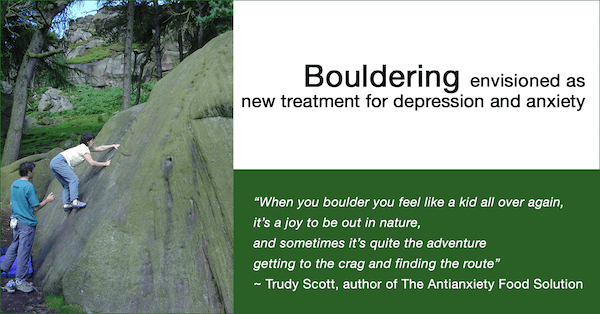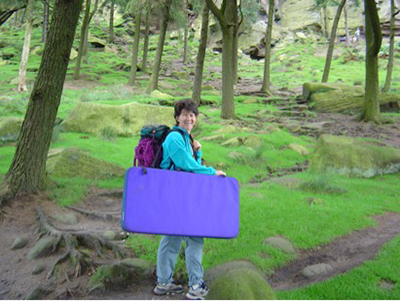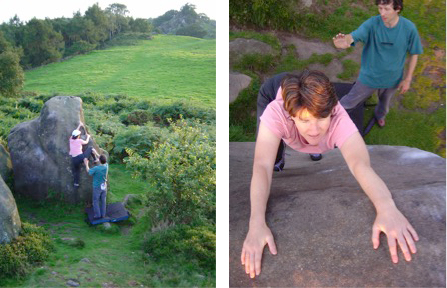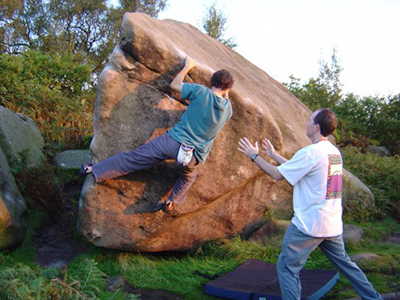
Climbing was my main sport for 15 years and I absolutely loved it. Bouldering, a type of climbing where you don’t use ropes, is really fun and exciting, as well as a great form of exercise. So you can imagine my delight when I read about new research that suggests it may also be used to effectively treat symptoms of depression and anxiety. I’ve added anxiety because we see similar underlying causes and solutions, and many individuals with depression also suffer from anxiety.
Here are the details from the University of Arizona (UA) press release
A growing body of research suggests that bouldering, a form of rock climbing, can help build muscle and endurance while reducing stress — and a new study co-led by a University of Arizona doctoral student of psychology suggests that the activity also may be used to effectively treat symptoms of depression.
UA researcher Eva-Maria Stelzer and Katharina Luttenberger of the University of Erlangen-Nuremberg led a team that involved more than 100 individuals in a bouldering intervention in Germany, where some hospitals have begun to use climbing as a therapeutic treatment.
The participants were randomly split into two groups. One immediately began the intervention, while the other group had to wait to start bouldering, which involves climbing rocks or walls to a moderate height without ropes or a harness. Each participant bouldered for three hours a week over the course of eight weeks.
Depression symptoms improved from moderate depression to mild depression over 8 weeks:
The team’s major finding was that, during the therapy, the immediate intervention group’s Beck’s Depression scores improved by 6.27 points, but for the same time period the group that was initially wait-listed improved by only 1.4 points. This drop in score reflects an improvement of one severity grade from moderate to mild depression levels.
“Bouldering, in many ways, is a positive physical activity,” said Stelzer, who began researching the benefits of bouldering while completing her master’s in psychology at the University of Erlangen-Nuremberg in Germany and is now completing her doctorate at the UA. “There are different routes for your physical activity level, and there’s a social aspect along with the feeling of an immediate accomplishment when bouldering.”
Stelzer presented the study and findings during the 29th annual Association for Psychological Science Convention, recently held in Boston.
Like me, the study authors, Stelzer, Luttenberger and Schopper have experienced bouldering first hand:
Invested in improving interventions to aid with such conditions, Stelzer, Luttenberger and Schopper, who have offered bouldering sessions for patients at a care center in Germany, drew on their own experiences as avid rock climbers and boulderers to investigate the benefits the sport could provide to those dealing with anxiety, depression, social isolation and self-esteem issues.
This is how I describe bouldering: you feel like a kid all over again, it’s a joy to be out in nature, sometimes it’s quite the adventure getting to the crag and finding the routes, and the sense of accomplishment when you succeed at a difficult route is quite amazing. It’s very meditative and your focus has to be spot on. There is also problem-solving involved as you figure out the moves.
The social aspect is also great – encouraging and supporting your fellow-climbers/friends and then being encouraged by them when it’s your turn. There is also a big trust aspect as you “spot” each other, making sure you each land safely on the bouldering mat should you fall off the climb or decide to jump off because it’s too challenging.
There is of course the exercise aspect too. After the hike in to the rocks or crags, bouldering builds strength and stamina, and improved balance and flexibility.
Here are some pictures of us bouldering in the UK with friends Marc and Cath a few years ago.



I highly recommend bouldering if you ever get the opportunity. There are also indoor climbing gyms with bouldering walls if you don’t have a rock-climbing area near where you live, or if you’d like to give it a go there first before venturing out to the crags.
Luttenberger’s message is the same one I have for my clients:
I’d always encourage patients to do the sport they like — may it be climbing or something else — as sport is a wonderful possibility to prevent all possible sorts of illnesses, mental and physical.
Given the positive results, the team believes that bouldering may be used to complement traditional care for clinical depression:
Team members are now working to develop a manual that could be adopted for an eight-week program integrating bouldering and psychotherapeutic interventions for groups.
I really look forward to recommending a program like this for my clients, in conjunction with dietary changes and supportive nutrients!
Have you tried climbing or bouldering? Would you be open to an 8-week recommended supervised bouldering program?
If you haven’t tried climbing or bouldering and this isn’t your thing I’d love to hear what exercise you love to do in nature?
Hi Trudy,
I have a question that I can’t seem to find an answer to… All the current advice for people suffering from anxiety is to exercise because it can help. BUT for me, exercise makes my anxiety and OCD worse. I don’t have panic attacks, which I can understand having immediately after exercise while your heart rate is up. This increase in OCD and anxiety usually happens later in the day after having exercised. I don’t think I’m “over doing it”. I’m usually just doing around 25 minutes of an exercise dvd. So…. I want to exercise for all the health benefits but it doesn’t seem to be benefiting me mentally. I am a thin, 35 year old woman. I eat a very organic, gluten free, whole foods diet. Any ideas?
Thanks,
Sara
Sara
One way exercise can increase anxiety is via raising cortisol levels. Checking adrenal status via a saliva test would determine this. In this instance gentle walking, yoga or weights can be a better option.